| Srl | Item |
| 1 |
ID:
181709
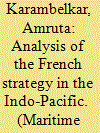

|
|
|
|
|
| Summary/Abstract |
France has emerged as a country with ambitions in the Indo-Pacific. It has vast territories, population and economic interests in the Indo-Pacific which necessitate a coherent national security policy towards this region. Even before the promulgation of its Indo-Pacific strategy, France has been involved in maritime Asia, primarily through defence sales. The changing balance of power has renewed European attention towards the Indo-Pacific wherein France is making its mark. This article studies the drivers of the French Indo-Pacific strategy and goes further to understand the fundamentals that have led to French attention to this region. A careful study of all major French policy articles lays out the strategic thinking in Paris. The article briefly presents bilateral and multilateral engagements of France. While traditional and non-traditional security issues and normative drive are apparent in the public discourse, it is clear that the major drivers are France's military–industrial complex and the desire to be able to influence the regional order.
|
|
|
|
|
|
|
|
|
|
|
|
|
|
|
|
| 2 |
ID:
181707


|
|
|
|
|
| Summary/Abstract |
As a landlocked country, Afghanistan has been given special privileges by the United Nations Convention on the Law of the Sea (UNCLOS) to access seaports through transit states. Pakistan, as a transit state to Afghanistan, has violated such provisions of international treaties on many counts by blocking transit routes for trade with India and by denying access to its Karachi Port. India’s Chabahar Port project in Iran acts as an alternative for Afghanistan to trade and aims to reduce its vulnerability of being dependent on Pakistan. This article attempts to highlight the India–Iran–Afghanistan trilateral understanding in Chabahar as an example of multilateral cooperation in fulfilling commitments made to international regimes, such as the UNCLOS, while bringing out the geopolitical challenges that India faces to complete the Chabahar project. In this context, the aim is to study the applicability of UNCLOS for rights of landlocked states and the importance of the Chabahar Port in protecting Afghanistan’s commercial freedom. The article also highlights India’s role in the region as it is responsible for implementing the Chabahar Port project.
|
|
|
|
|
|
|
|
|
|
|
|
|
|
|
|
| 3 |
ID:
181708
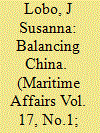

|
|
|
|
|
| Summary/Abstract |
The Indo-Pacific has emerged as an important region in international politics where the major powers are deeply engaged in reshaping the security architecture. Over the last few years, India and China have drawn their policies by employing competitive strategies that strengthen as well as neutralise their respective power positions in the Indian Ocean Region, particularly in South Asia and the South China Sea. China's “String of Pearls” strategy and the “Belt and Road Initiative” undermine India's influence in the Indian Ocean Region, where the changing geo-economic and geostrategic imperatives pose threat to its interests. This mounts pressure on New Delhi to respond by pursuing counter-strategies to secure its interests in the Indo-Pacific region. The article further explains how India and the United States’ interests are converging against an assertive China in the Indo-Pacific and how the two states’ security and maritime collaborations are balancing their common rival by maintaining a favourable status quo in the region.
|
|
|
|
|
|
|
|
|
|
|
|
|
|
|
|
| 4 |
ID:
181705


|
|
|
|
|
| Summary/Abstract |
India's ambitions in East Asia are evident and pragmatic. It has a growing bonhomie with Japan to collaborate with on bilateral level and within multilateral frameworks as well. In consideration of Japan's caution towards the US and China, it is looking for a sustainable partnership that has mutually appreciative policy axes and the capabilities to achieve bilateral objectives with it. It has repeatedly identified India as the most viable option to adopt this role. The author has taken into consideration multilateral arrangements and larger international relations with countries like China to understand the limitations to Indo-Japanese relations, with recommendations on how to overcome them. Furthermore, the article explores the possibility of a larger multilateral security regime with the Republic of Korea and Taiwan, in light of mutual interests and the latest trends of multilateralism that have swept Asia in the twenty-first century. Finally, the paper observes that India's role in East Asia does not have to be fundamentally defined by or structured on the basis of the actions of a third party.
|
|
|
|
|
|
|
|
|
|
|
|
|
|
|
|
| 5 |
ID:
181704
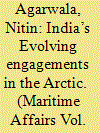

|
|
|
|
|
| Summary/Abstract |
The Arctic has attracted world attention in recent years as global warming began melting the sea ice at a much faster rate than recorded after 1979, the year when record-keeping began for the region. This new-found attention is also linked with greater accessibility of the Arctic Ocean, which is creating a geopolitical competition for resources and control. So far, the world media has focused primarily on the efforts of China in the Arctic due to its economic might, resulting in numerous academic literature. In comparison, the efforts of India in the Arctic have been relatively lesser researched and discussed. Those available have provided conflicting and sometimes debating opinions. It is with this understanding that the article discusses India’s past and present engagement in the Arctic, with possible future trends and recommendations for India’s evolving engagements in this region.
|
|
|
|
|
|
|
|
|
|
|
|
|
|
|
|
| 6 |
ID:
181703
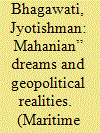

|
|
|
|
|
| Summary/Abstract |
The article argues that India and China, in their quest for maritime supremacy in the Indian Ocean, are adopting the seminal ideas and strategies propounded by the celebrated naval strategist and historian, Admiral Alfred Thayer Mahan. It analyses the reasons behind India and China’s adoption of the Mahanian naval doctrine and their increasing outreach towards the Indian Ocean region. The article also delves into the implications of following aggressive naval strategies by the two states as well as the discrepancies involved in their respective naval strategies. It concludes by arguing that although the two states are unlikely to engage in a naval war with each other in the foreseeable future, occasional flare-up in hostility and confrontation, as witnessed recently on the land border region of Ladakh, cannot be ruled out as their interests begin to affect each other more in future.
|
|
|
|
|
|
|
|
|
|
|
|
|
|
|
|
| 7 |
ID:
181710
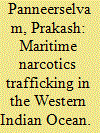

|
|
|
|
|
| Summary/Abstract |
Maritime narcotics trafficking in the Indian Ocean has increasingly become a major security concern for India and other countries in the region, with the Afghanistan–Pakistan corridor being the primary conduit facilitating illegal drug trade via the sea-route in the Western Indian Ocean. However, there is a gap in understanding the extent and manner of the criminal syndicate involvement in the maritime narcotics drug trafficking in the region. This commentary looks at the emerging maritime-bound illicit drug trafficking in the region and also analyses the modus of operandi of the criminal syndicate in Pakistan to evade detection from the law-enforcement. It also examines the role of Combined Maritime Force (CMF) and regional navies in detecting and tracking the maritime narcotics trafficking in the Western Indian Ocean.
|
|
|
|
|
|
|
|
|
|
|
|
|
|
|
|
| 8 |
ID:
181711
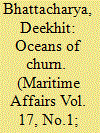

|
|
|
|
|
| Summary/Abstract |
Australia published a Strategic Update in 2020 to its 2016 Defence White Paper. The update represents a portentous shift in Australia’s understanding and response to its strategic environment. China’s increasingly belligerent stance, its use of grey-zone activities and an increasingly jittery United States have pushed Australia to actively seek robust anti-access/area denial (A2AD) capabilities. In addition, Australia intends to focus on its neighbourhood while shedding its anxieties regarding the Quad. The piece aims to briefly contextualise the ramifications of the update with its motivations. It also analyses Chinese behaviour on the world stage and argues for greater synergy in defence coordination between the Quad partners.
|
|
|
|
|
|
|
|
|
|
|
|
|
|
|
|
| 9 |
ID:
181706


|
|
|
|
|
| Summary/Abstract |
The rising tension between China and Vietnam with regard to the South China Sea has revised Hanoi's approach to its national defence policy. No longer benign and mute, it is taking an assertive stance and vocalising its opposition to the historical claims of Beijing. Hanoi is also becoming much more open to American presence in the South China Sea. This article examines the impact of geostrategic competition in the South China Sea on United States (US)–Vietnam and Indo-Vietnam bilateral relations, providing Hanoi an opportunity to challenge Beijing's illegal claims in the region.
|
|
|
|
|
|
|
|
|
|
|
|
|
|
|
|